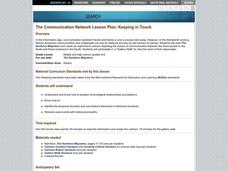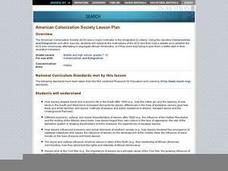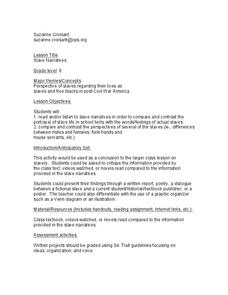Curated OER
What is the Meaning of This?
Students explore cause and effect and relate it to a historical event. They research the meaning behind the symbols and images used on the Indian Head Cent and the events that were occurring during the time the Indian Head cent was...
US House of Representatives
“The Fifteenth Amendment in Flesh and Blood,” The Symbolic Generation of Black Americans in Congress, 1870–1887
The reading of a contextual essay launches a study of Black Americans who served in Congress from 1870 through 1887. Young historians identify the African Americans who served during this period, investigate the ways they won national...
American Battlefield Trust
Emancipation 1861 to 1863
Academics read newspaper articles from 1861 to 1863 regarding Emancipation and answer questions to understand how public opinion changed over time and why. The activity provides scholars with good historical context and the vocabulary...
Facing History and Ourselves
Violence and Backlash
Revolution and counterrevolution. Protest and counter-protest. Collaborators and bystanders. The focus of the fifth resource in the Reconstruction Era and Fragility of Democracy series is on the political violence that followed Radical...
DocsTeach
Letter to President Abraham Lincoln from Annie Davis
What freed enslaved people? The answer, it turns out, is complicated. Using a set of online documents and writing prompts, young historians examine a series of primary sources, including a letter from a woman asking if she was freed and...
Digital Public Library of America
Uncle Tom's Cabin by Harriet Beecher Stowe
Harriet Beecher Stowe's Uncle Tom's Cabin has generated controversy since its publication in 1852. Here is a set of 12 primary sources that capture the controversies of the times while adding dimension and depth to any study of the novel.
Digital Public Library of America
The Underground Railroad and the Fugitive Slave Act of 1850
Escaping Enslaved people attempting to escape didn't need a ticket to ride on the Underground Railroad. Here is a packet of primary sources that reveal the kind of courage and determination they did need to face the challenges to gain...
Facing History and Ourselves
A Contested History
Memories of and interpretations of history change—that's the key takeaway from a lesson that has young historians compare the story of the Reconstruction Era as told by the historians of the Dunning School to the view of scholars today...
National Woman's History Museum
Women's Suffrage Movement
The National Women's History Museum offers a 20-slide presentation that details the history of the Women's Suffrage Movement from its creation in the 1830s through the passage of the Nineteenth Amendment in 1920.
University of Virginia
Uncle Tom's Cabin: The Text
Harriet Beecher Stowe's groundbreaking work Uncle Tom's Cabin is both historically and literarily relevant today. Read the entire text in an easily navigated site that allows learners to select their chapters and easily move to the next...
DocsTeach
Oh Freedom! Sought Under the Fugitive Slave Act
Using the harrowing story of the Crafts, a couple enslaved in the South who escaped to freedom, young historians trace the story of the Fugitive Slave Act. After examining documents, including affidavits and arrest warrants for the...
PBS
History of Juneteenth and Why It’s Now a National Holiday
June 19 is now a United States federal holiday. Young historians examine the background of the first Juneteenth celebrations and why on June 15, 2021, Congress finally approved "Juneteenth National Independence Day" as a federal holiday.
C3 Teachers
Emancipation: Does It Matter Who Freed the Slaves?
Scholars generally agree on the emancipation of enslaved people in the United States. This inquiry-based lesson asks high schoolers to consider more than the claims of who freed the enslaved people but the significance of the issues...
Yale University
"This is Not a Story to Pass On": Teaching Toni Morrison's Beloved
Tenth graders read "Beloved" by Toni Morrison. In groups, they research the life and works of Morrison and read a speech by Sojouner Truth. Using the novel, they discuss the experiences of slaves and the effect of slavery on their...
Curated OER
SLAVERY IN ARKANSAS, THE LIFE OF A SLAVE
Learners participate in a variety of activities to demonstrate an understanding of mid 1800 role of slaves. Vocabulary, writing and math are integrated into the lesson.
Curated OER
Diverse Voices - African American Ventures
Students research African American history and the Underground Railroad. In this African American history lesson, students discuss the Drinking Gourd. Students read 'If You Traveled the Underground Railroad' and discuss. Students work in...
Curated OER
Keeping in Touch
Young scholars read about the Northern Migration of African Americans in the 19th century, and create an eight panel cartoon depicting the means of communication between freed slaves in the North and those still enslaved in the South.
Curated OER
The Hartford Convention and the Battle of New Orleans
In this United States history worksheet, students utilize a word bank of 10 terms or phrases to answer 10 fill in the blank questions about the Hartford Convention and the Battle of New Orleans. A short answer question is included as well.
Curated OER
Historical Puppet Play
Fourth graders analyze the book Train to Midnight, based on the Underground Railroad. They compose and perform a puppet play based on the book. Students perform and videotape their puppet plays.
Curated OER
This Guilty Land
Middle schoolers investigate the actions and motives of John Brown. In this abolition lesson, students discover details about Brown's background as a free-state and abolition supporter. Middle schoolers discuss his role as that of a...
Curated OER
American Colonization Society Lesson Plan
Students read an article online "Colonization and Emigration" and break into debating groups. They research points that support their side, namely whether or not the American Colonization Society was for or against segregation. They...
Curated OER
John Brown's Raid on Harper's Ferry and John Brown's Body
Fourth graders discuss John's Brown's Raid on Harper's Ferry. In this John Brown lesson, 4th graders analyze a newspaper article about the raid, and write a descriptive obituary about John Brown. Students view pictures of John Brown and...
Curated OER
Building a Memorial to the Underground Railroad
Students interpret historical evidence presented in primary and secondary resources. In this Underground Railroad activity, students examine the attributes and function of the Underground Railroad in order to...
Curated OER
Slave Narratives
Students examine the slave perspective and how it differs from stories we hear in text books. For this slave narrative lesson, students use primary source narratives to compare how slave life was expressed by the slaves to how slave life...
Other popular searches
- Civil War Slavery
- Civil War Slavery Dance
- Post Civil War Slavery
- Civil War Slavery Geogrpahy
- Civil War and Slavery
- Impact of Slavery on Civil War

























